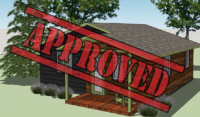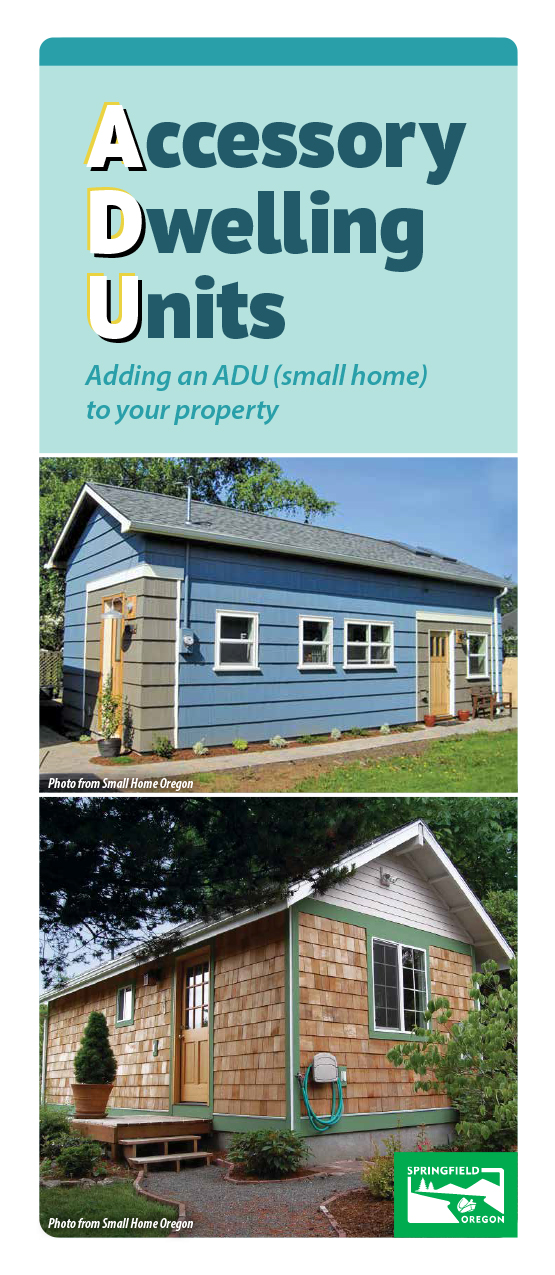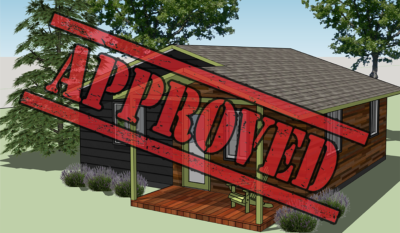Accessory Dwelling Units
An Accessory Dwelling Unit (ADU) is a small, self-contained dwelling that is allowed in conjunction with a primary dwelling. An ADU has a separate entrance, kitchen, bathroom, and sleeping area.
An ADU can be an apartment created within an existing home or garage, an addition onto a home or above a garage, built as a freestanding cottage, created by converting an existing dwelling (of less than 800 square feet) and building a primary dwelling, or designed and constructed as part of a new housing development.
Ready-Build ADU Plan
 The City now has a pre-approved building plan for an ADU. This “ready-build” plan is free to download and use which saves the cost of hiring an architect, though fees and permits still apply. However, applicants who use this plan will have a reduced building permit plan review fee.
The City now has a pre-approved building plan for an ADU. This “ready-build” plan is free to download and use which saves the cost of hiring an architect, though fees and permits still apply. However, applicants who use this plan will have a reduced building permit plan review fee.
It complies with the Oregon Residential Specialty Code and meets the ADU Clear and Objective Standards of the Springfield Development Code. City Planning review and approval is required prior to submitting a building permit to review the site-specific elements. Contact the Planner on Duty at 541-726-3753 to learn about the Planning review requirements.
See the plan at our Ready-Build Plans webpage, which can also be found using the shortcut: bit.ly/ready-build.
Temporary Waiver of System Development Charges for ADUs
Through June 30, 2027 (subject to annual review) the City of Springfield is waiving transportation, stormwater, and local wastewater system development charges (SDCs) for newly permitted ADUs. This waiver reduces the cost of constructing an ADU (read more about Springfield’s SDCs here). The Metropolitan Wastewater Management Commission has budgeted funds to offset the SDCs for ADUs that are newly constructed homes. In August 2018, Springfield Utility Board reduced its SDCs for ADUs (read more here). Note that SDCs imposed by Willamalane Park and Recreation District are still in effect.
Yimbyes.org Podcast on Springfield ADUs
Great for Springfield residents, this podcast from October 2019 defines ADUs and explains how and why the City of Springfield is encouraging them. Local homeowner Karen McLaughlin and ADU designer Tobin Newburgh describe their experience designing and building an ADU in Springfield. The episode also touches on the process of obtaining ADU permits. (Please note that the requirements for developing an ADU in Springfield have changed somewhat since this podcast was recorded.)
Changes to Springfield’s Development Code Regarding ADUs
Code requirements can be found in Section 3.2.275 of the Springfield Development Code.
On May 16, 2022, the City Council adopted Ordinance 6443 to amend the Development Code to streamline the code and make it easier to use. The changes incorporate requirements from House Bill 2001 (passed by the Oregon legislature in 2019) which is primarily for middle housing but also prevents cities from requiring parking for ADUs.
Applying for an ADU
In most cases, use the Accessory Dwelling Unit Type 1 application form to apply for an ADU. If your property is in the Washburne Historic District, or if you are meeting alternative design standards, please use the Accessory Dwelling Unit Type 2 application form. Check here for application forms and to view the fees associated with Type 1 and Type 2 Land Use applications for ADUs. Once you have obtained land use approval, you may apply for a Building Permit Application and Land Drainage and Alteration Permit (if required).
Call the planner on duty at 541-726-3753 if you have questions about the application process or questions specific to adding an ADU on your property.
Accessory Dwelling Units Benefit the Community by:
- Increasing the number and type of affordable housing units without consuming land in the city’s limited inventory of undeveloped land. In particular, they increase the supply of small rental units which is where the rental market is currently the tightest.
- Increasing density in existing neighborhoods, taking advantage of existing infrastructure.
- Creating opportunities for intergenerational living, on-site caretakers/assistants.
- Diversifying the demographics of an existing neighborhood.
- Providing financial benefit to the property owner.
- Triggering economic development at a local scale through local builders/contractors.
Contact Information
Planner on Duty
541-726-3753


